How to Use Gel Stain – Update Cabinets Without Sanding
Learn how to use a gel stain to easily update cabinets without any heavy sanding or stripping with this step-by-step tutorial and video.

Let’s talk about how to use gel stain over old cabinets.
The Before
In my recent bathroom refresh, the one thing that needed major help was the vanity.
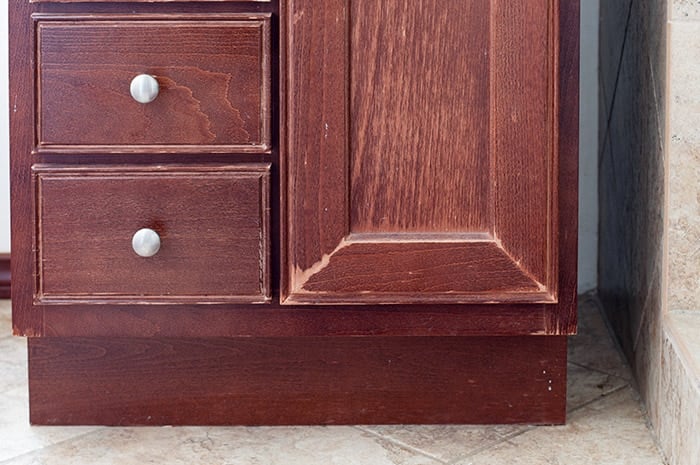
It had a LOT of moisture damage. We don’t have a budget to change them out just yet. Plus the vanity has pretty good bones and the perfect amount of storage with the 3 drawers.
Truth is, I really wanted to paint them a fun color but that would simply not work with the tile in the shower and there was no way I was going to replace the tile.
To tie it in with the tile in the shower, I decided to go with dark brown stain.
Now restaining an existing cabinet meant having to sand it down first and nope, I was not doing that!
When I started looking into alternatives, I found gel stain!!!
Can I use gel stain over finished wood?
Yes, absolutely!! That is exactly what I did!! Plus I barely used a sanding block!! See below for the complete tutorial including a video!
***This post contains affiliate or referral links. It is a way for this site to earn advertising fees by advertising or linking to certain products and/or services. Please read my full disclosure here ***
Material Needed
- Gel Stain in color of your choice. I used this gel stain.
- Foam brushes
- 220 grit sanding block
- Tack cloth
- Nitrile gloves
- Wet wipes
- Top coat
- Masking tape
How to use gel stain over stained wood cabinets
I showed how to use the gel stain to update the cabinet door live on Facebook. Watch below.
Detailed step by step tutorial follows below.
Updating Cabinets with gel stain –
Step 1 – Clean the cabinets
- Remove all the knobs and take apart any removable parts of the cabinets.
In my case, it was one door and three drawers.
Tip – Make sure to label the location of each door or drawer so you don’t forget where it came from later.
- Wipe down the cabinets to remove all the dirt and grime it may have accumulated. I used a wet wipe to do this.

Step 2 – Sand
- Give the surface a very light scuff with the sanding block.
You don’t need to sand a lot – just enough to create a light scuff. I talk more about this in the video above.
- Used a tack cloth to wipe away all the sanding dust from the surface.
Step 3 – Apply Gel Stain
- Use a foam brush to apply the gel stain in the direction of the wood grain.
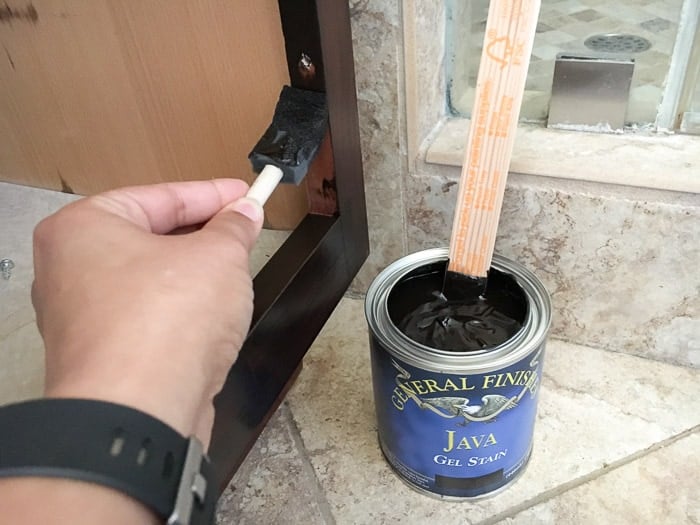
It won’t look too very good after the first coat but after the second coat, it looks great!
See the video for more details!
Important – Just make sure you the previous coat is dry to touch before adding a new one.
Also, Be sure to use nitrile gloves for this because you don’t want the stain on your hands. Yes, I did not and learned it the hard way 🙂
Important – Be sure to put down masking tape on any edges that tough a different surface to protect them!
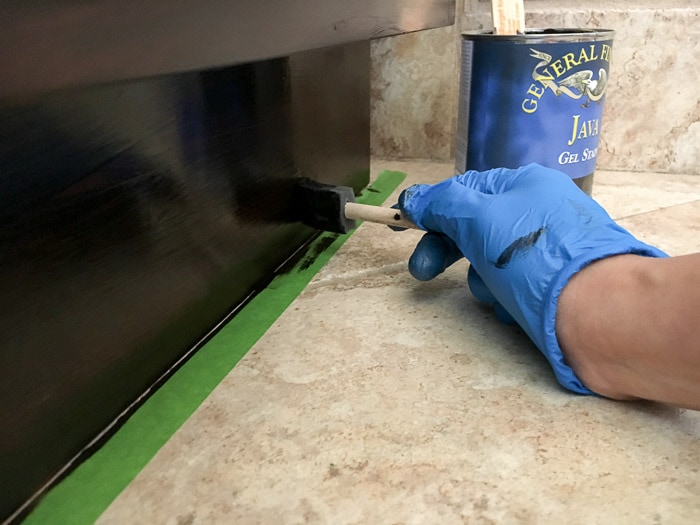
Step 4 – Seal
Be sure to allow at least 24 hours to dry before applying the sealing finish.
- Apply a sealing finish using a foam brush. I like to use this high-performance top coat.
You want to apply at least 2 coats of the sealing finish with 6-8 hours between each coat.
This will add just the right amount of sheen and help protect the cabinet.

That’s it!!
The After
It really was that simple! It looks as good as new now!
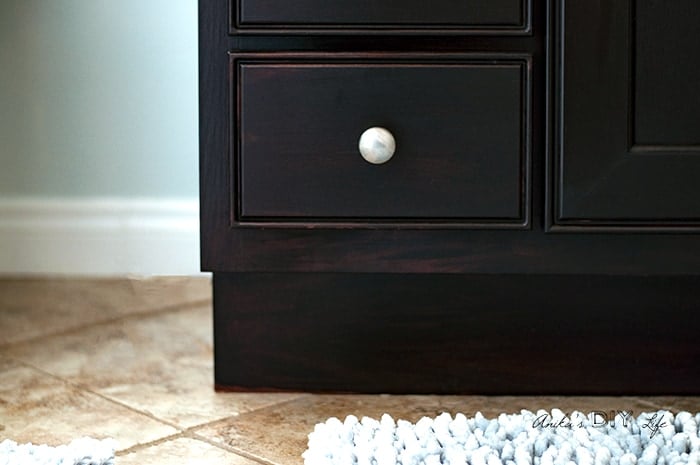
You couldn’t even tell by looking at it that it was in such a bad state at some point. Plus I love that I didn’t have to use a lot of elbow grease!
This was the first time I have used it and I must say I was quite impressed! I will surely be using it more and more!
I am digging the “Java” color too. It is so rich and dark. Did you see the DIY floating ladder shelf I made to add storage to this bathroom?
RELATED: How to paint veneer cabinets
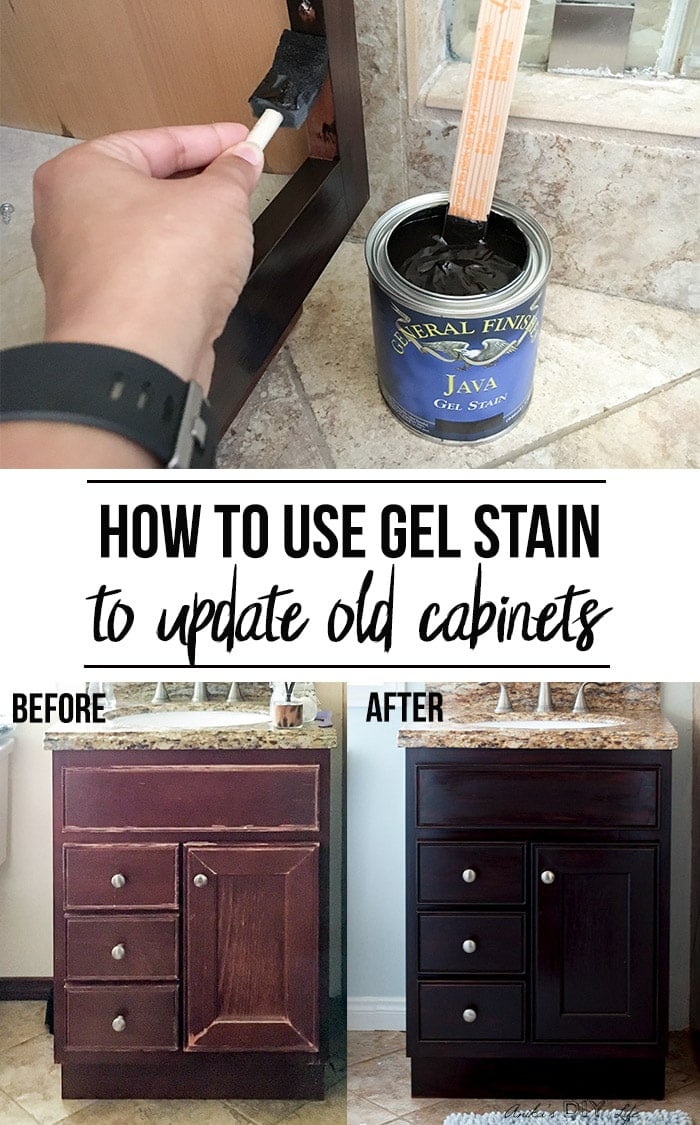
Anika's goal is to inspire and empower beginners with woodworking, DIY, home improvement, and home decor ideas.
She wants everyone to unlock their creative potential and experience the feeling that comes with making something. Nothing feels better better than seeing something and saying "I can make that!"




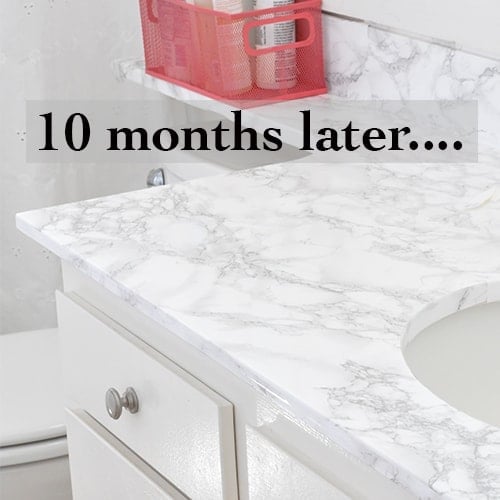



THANK YOU VERY MUCH .IF YOU CAN SEND ME MORE.
Would you recommend this for kitchen cabinets?
Hi Helen, Yes, I definitely would.
I used this exact same stain (brand and color) on both bathrooms. I love the finished look. I went with an extra coat just to get a full, solid color and then applied the clear coat. I did mine approximately 5 years ago and they still look great. We paired the freshly stained cabinets with brushed nickel hardware and couldn’t have asked for a better look in our bathrooms.
We just bought a new home and I’ll be doing those cabinets the same….
Hi Michelle, I am so glad to hear the cabinets are holding up well! Isn’t it amazing what a little update can do?!